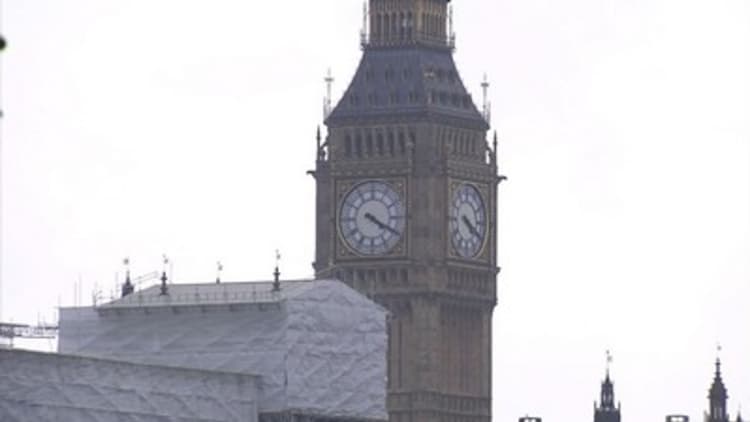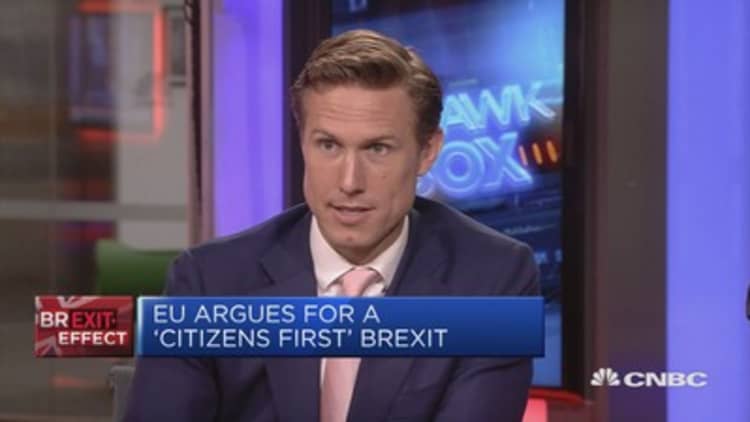The European Union has warned the U.K. government that it needs to accept an exit bill before Brexit talks can progress.
It is a question of "trust" and "responsibility" to accept that the U.K. has to settle the accounts before it departs from the bloc, the EU's chief negotiator Michel Barnier said Wednesday, just days before the second round of Brexit talks takes place.
"I am not hearing any whistling, just a clock ticking," Barnier told journalists in Brussels, drawing the U.K.'s attention to the fact that it only has until March of 2019 to agree on a future relationship with the EU.
His comments were also in direct response to words from the U.K.'s Foreign Secretary Boris Johnson. On Tuesday, Johnson said in the U.K. Parliament that European leaders could "go whistle" if they expect the U.K. to pay a large Brexit divorce bill.
The exit bill has been one of the most controversial subjects following the U.K.'s decision to leave the European Union. Brussels wants the U.K. to pay for the financial commitments it made as a member of the EU, but in London, officials are reluctant to give any more to the EU as they want to claim financial and legislative independence from the member bloc.

"Thousands of programs, thousands of commitments, a joint commitment, a neutral commitment between the U.K. and the 27 others … What happens with those agreements, they're throughout Europe; they're all over the place. What happens to them … That's a question of trust," Barnier explained, referring to the importance of closing the accounts.
"It's not a punishment, it's not revenge … It's simply settling accounts. It's not easy and it might be expensive but any separation means settling accounts, no more, no less, we aren't asking the U.K. for a single euro or a single pound more than they have legally undertaken providing."
London and Brussels have to agree on the terms for calculating the bill but early estimates have indicated that this could be between 60 billion euros ($68.92 billion) and 100 billion euros ($114 billion).

But there's more at stake. The EU has complained that the U.K. government hasn't been clear about citizens' rights nor about the issue of the Irish border. All of these subjects are crucial and are to be agreed on at the same time, otherwise the EU will not discuss how both could work in the future.
"The sooner we receive clarification on the British positions on the topics, that we haven't heard from them on, the better."
Barnier said that his team is ready to work day and night, weekends and holidays if necessary, but it first needs to know where the U.K. government stands.
The government led by Prime Minister Theresa May has made an initial proposal on citizens' rights but the EU has complained that it does not go far enough. It doesn't provide the same level of reciprocity to EU citizens' living in the U.K. compared to the British living in other European countries, Barnier said.
"Quite frankly it's not really in my nature or in my philosophy to try and push our partners across the table to the edge. Particularly not on this specific topic of citizens' rights," Barnier said. "I hope we will find an intelligent solution to this at least on the principle of reciprocity," he added.
Moody's raises prospects of a no deal
The EU and the U.K. are holding their second round of Brexit talks on Monday, July 17. Despite still being at an early stage of negotiations, Moody's said Wednesday that the chances of an abrupt exit from the EU have risen.
"While the negotiations with the EU have recently started, it remains unclear whether the U.K. government can eventually deliver a reasonably good outcome for the U.K.," said Kathrin Muehlbronner, a Moody's senior vice president, in a statement.
"The likelihood of an abrupt - and damaging - exit with no agreement and reversion to WTO trading rules has increased compared to our expectation directly after the referendum, with the government so far pursuing objectives that imply a 'hard' exit,'" she said.


